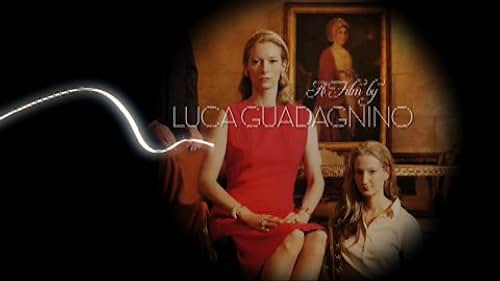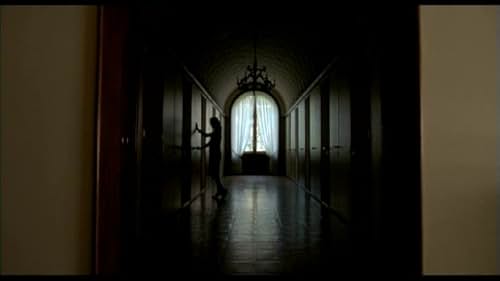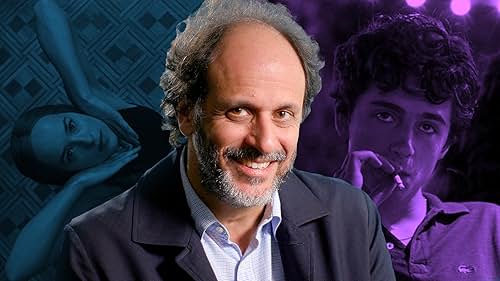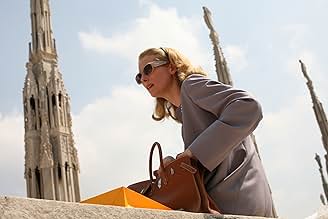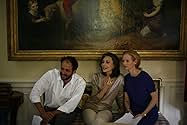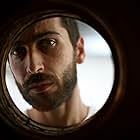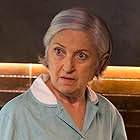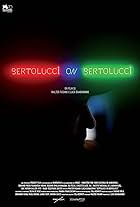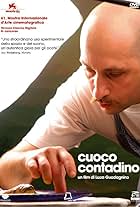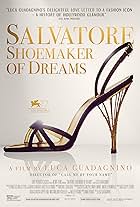Emma left Russia to live with her husband in Italy. Now a member of a powerful industrial family, she is the respected mother of three, but feels unfulfilled. One day, Antonio, a talented ch... Read allEmma left Russia to live with her husband in Italy. Now a member of a powerful industrial family, she is the respected mother of three, but feels unfulfilled. One day, Antonio, a talented chef and her son's friend, makes her senses kindle.Emma left Russia to live with her husband in Italy. Now a member of a powerful industrial family, she is the respected mother of three, but feels unfulfilled. One day, Antonio, a talented chef and her son's friend, makes her senses kindle.
- Nominated for 1 Oscar
- 16 wins & 47 nominations total
Director's Trademarks: The Films of Luca Guadagnino
Director's Trademarks: The Films of Luca Guadagnino
Suspiria director Luca Guadagnino takes IMDb through his approach to filmmaking, from longtime collaborator Tilda Swinton, to why he hopes he doesn't have a "style."
Storyline
Did you know
- TriviaLead actress Tilda Swinton learned both Italian and Russian for the part, neither of which she spoke before filming.
- GoofsWhen Edoardo and Elisabetta meet in London, there's a lot of shadow on the pavement. When they walk away together in the next shot, there's a lot more sun. But the weather can change quickly in the UK.
- Quotes
Elisabetta Recchi: Happy is a word that makes one sad.
- ConnectionsFeatured in At the Movies: Venice Film Festival 2009 (2009)
Featured review
Attempting to revive the golden age of Italian cinema that featured such greats as Rossellini, Fellini, Visconti, Pasolini, and others, Luca Guadagnino has fashioned a sumptuous, elegant, and physically beautiful film called I Am Love or in its Italian title Lo Sono Amore. Unfortunately, while the film has moments of emotional power, it fails to coalesce into a satisfying whole and ends up feeling more pretentious than penetrating.
Written by Barbara Alberti, Ivan Cotroneo, Walter Fasano and Guadagnino and based on a story by the director, the film begins in snowy Milan in the winter. The very wealthy Recchi family, owners of a textile factory that it is hinted supported Musolini and the Fascists during the war, is having a dinner party in their aristocratic house catered by a host of servants wearing white gloves. The elderly grandfather and patriarch of the family Edoardo Sr. (Gabrielle Ferzetti) is about to retire, evoking the Visconti film, The Leopard. Shockwaves roll throughout the gathering, however, when he names both his son Tancredi (Pippo Delbono) and his handsome grandson Edo (Flavio Parenti) as joint controllers of the business. Befitting the family's pride, when Edo tells the group that he has come in second in a race, the elderly patriarch says "The Recchis never lose." The Russian born Emma (Tilda Swinton) is Tancredi's wife and mother of three grown children, sons Edo and Gianluca (Mattia Zacarro), and artist and photographer daughter Betta (Alba Rohrwacher). Though on the surface she is a loyal and supporting wife and mother and has made a complete adjustment to the Italian bourgeois way of life, underneath there is a growing boredom and discontent as sensed by her servant Ida (Maria Paiato). We get a hint of this stirring when daughter Betta reveals to her that she is a Lesbian and is in love with a fellow classmate in England. The longing for adventure crystallizes further when she meets Edo's friend Antonio (Edoardo Gabbriellini) who is a master chef who is planning to open a restaurant with Edo.
Joining her mother-in-law Allegra (Marisa Berenson) and Edo's girl friend Eva (Diane Fleri) for lunch, Emma's senses are fully awakened while eating prawns prepared by Antonio. Passing through San Remo on a trip to Nice to attend an exhibition to which she has been invited by daughter Betta, Emma unexpectedly bumps into Antonio who eagerly invites her to view the restaurant site. Despite the fact that Antonio is probably 10 to 15 years younger than her, this chance encounter leads to a bursting forth of Emma's tightly controlled sexual inhibitions and a swirl of passionate lovemaking in the rustic countryside, their engaged body parts mirrored by close-up shots of flowers and insects in a very poetic but overly aestheticized manner.
Reminiscent of Ibsen's 1879 play The Doll's House, the main thrust of the film is the repression of an upper class woman who suddenly discovers that there should be more zest to her life, presumably triggered by her daughter's openness in discussing her sexual preference. The love affair, however, triggers many changes in the Recchi family, both economically and psychologically. Tancredi is forced to sell their business to an Indian investor who explains that "capitalism is democracy". The scenes in London with the financiers are very strong but are treated as a minor sub-plot with the emphasis quickly given over to the family's psychological distress.
When Edo puts two and two together and realizes his mother's sexual adventures with his best friend, the result is tragedy for the entire family, a series of events handled by the director in an involving but melodramatic fashion. Though Emma has been praised by some for the courage she shows in breaking away from a static marriage, one wonders if a greater courage would perhaps have been shown if she had gotten in touch with the love she once had for her husband, fulfilled her solemn oath, "till death do us part", and resumed her responsibilities as a caring mother. While I was moved by much of the visual beauty of the film and the idea of breaking with tradition and listening to the voices within, I was infrequently emotionally involved with the characters and I Am Love felt distant and often contrived.
Written by Barbara Alberti, Ivan Cotroneo, Walter Fasano and Guadagnino and based on a story by the director, the film begins in snowy Milan in the winter. The very wealthy Recchi family, owners of a textile factory that it is hinted supported Musolini and the Fascists during the war, is having a dinner party in their aristocratic house catered by a host of servants wearing white gloves. The elderly grandfather and patriarch of the family Edoardo Sr. (Gabrielle Ferzetti) is about to retire, evoking the Visconti film, The Leopard. Shockwaves roll throughout the gathering, however, when he names both his son Tancredi (Pippo Delbono) and his handsome grandson Edo (Flavio Parenti) as joint controllers of the business. Befitting the family's pride, when Edo tells the group that he has come in second in a race, the elderly patriarch says "The Recchis never lose." The Russian born Emma (Tilda Swinton) is Tancredi's wife and mother of three grown children, sons Edo and Gianluca (Mattia Zacarro), and artist and photographer daughter Betta (Alba Rohrwacher). Though on the surface she is a loyal and supporting wife and mother and has made a complete adjustment to the Italian bourgeois way of life, underneath there is a growing boredom and discontent as sensed by her servant Ida (Maria Paiato). We get a hint of this stirring when daughter Betta reveals to her that she is a Lesbian and is in love with a fellow classmate in England. The longing for adventure crystallizes further when she meets Edo's friend Antonio (Edoardo Gabbriellini) who is a master chef who is planning to open a restaurant with Edo.
Joining her mother-in-law Allegra (Marisa Berenson) and Edo's girl friend Eva (Diane Fleri) for lunch, Emma's senses are fully awakened while eating prawns prepared by Antonio. Passing through San Remo on a trip to Nice to attend an exhibition to which she has been invited by daughter Betta, Emma unexpectedly bumps into Antonio who eagerly invites her to view the restaurant site. Despite the fact that Antonio is probably 10 to 15 years younger than her, this chance encounter leads to a bursting forth of Emma's tightly controlled sexual inhibitions and a swirl of passionate lovemaking in the rustic countryside, their engaged body parts mirrored by close-up shots of flowers and insects in a very poetic but overly aestheticized manner.
Reminiscent of Ibsen's 1879 play The Doll's House, the main thrust of the film is the repression of an upper class woman who suddenly discovers that there should be more zest to her life, presumably triggered by her daughter's openness in discussing her sexual preference. The love affair, however, triggers many changes in the Recchi family, both economically and psychologically. Tancredi is forced to sell their business to an Indian investor who explains that "capitalism is democracy". The scenes in London with the financiers are very strong but are treated as a minor sub-plot with the emphasis quickly given over to the family's psychological distress.
When Edo puts two and two together and realizes his mother's sexual adventures with his best friend, the result is tragedy for the entire family, a series of events handled by the director in an involving but melodramatic fashion. Though Emma has been praised by some for the courage she shows in breaking away from a static marriage, one wonders if a greater courage would perhaps have been shown if she had gotten in touch with the love she once had for her husband, fulfilled her solemn oath, "till death do us part", and resumed her responsibilities as a caring mother. While I was moved by much of the visual beauty of the film and the idea of breaking with tradition and listening to the voices within, I was infrequently emotionally involved with the characters and I Am Love felt distant and often contrived.
- howard.schumann
- Jul 31, 2010
- Permalink
- How long is I Am Love?Powered by Alexa
Details
- Release date
- Country of origin
- Official sites
- Languages
- Also known as
- Tôi Là Ái Tình
- Filming locations
- Villa Necchi Campiglio, Milan, Lombardia, Italy(Recchis' villa)
- Production companies
- See more company credits at IMDbPro
Box office
- Budget
- €3,600,000 (estimated)
- Gross US & Canada
- $5,005,465
- Opening weekend US & Canada
- $121,504
- Jun 20, 2010
- Gross worldwide
- $12,753,894
- Runtime2 hours
- Color
- Sound mix
- Aspect ratio
- 1.85 : 1
Contribute to this page
Suggest an edit or add missing content


